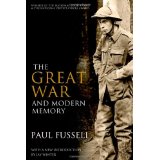The Outbreak of WW1: 100 Years Ago Today
I just read an article in the New York Times about the outbreak of World War 1 exactly 100 years ago. It brought back memories.
I had a French teacher at USC who fought in the Great War. He used to tear up when talking about it so many years later. He once told us that France lost 60,000 men in one battle.
Driving across Northern France in the 1970s when I lived there, you would see endless fields of crosses.
The war was triggered by a number of blunders. It also ended the Ottoman Empire and changed the map of Europe.
I watched the film Gallipoli alone and got really choked up. I couldn’t go straight home; I stopped by a friend’s home for emotional rescue and support. It was devastating.
Paul Fussell, Jr. wrote an amazing book about The Great War: It is called The Great War and Modern Memory. It is not new but was the best account of how WWI affected people, on the battlefield and off. It told us about English poets like Rupert Brooke and Siegfried Sassoon, who poetically rendered the ironies and horrors of the new war. In fact, Fussell asserted that because of the ironies of The Great War, irony would become the dominant motif in modern literature. WWl was the first with chemical weapons. It was the first with aerial bombardment and dogfights. The first where you couldn’t see your enemy.
Fussell said that the literary result of WWI was that writers turned to irony. Because of the ironies of the war. British solidiers being given their favorite canned foods in the trenches. The inability to combat mustard gas.
I highly recommend this book.



← BACK
